Chapter 1: Introduction - The Role of Logic in Films.
Logic is a fundamental aspect of human reasoning and decision-making, and it plays a significant role in our everyday lives. Similarly, logic is also an important element of modern cinema, and understanding its role in film can enhance our appreciation and critical analysis of movies.
In this book, "Logic vs Films: Exploring the Impact of Logic in Modern Cinema," we aim to explore the ways in which logic is used in films to create compelling narratives, realistic visual effects, and emotional impact. By examining the use of logic in various aspects of films, we hope to provide readers with a deeper understanding of the creative possibilities and limitations of logic in modern cinema.
The first chapter sets the stage for this exploration by defining what we mean by "logic" and how it applies to films. We explain that logic is a systematic and objective way of reasoning that is used to draw conclusions based on evidence and observations. We also introduce the idea that logic can manifest itself in various aspects of films, such as plot, character, and visual effects.
Furthermore, we discuss why understanding logic is important for filmmakers and audiences alike. For filmmakers, understanding logic can help them to create more engaging and memorable films by using logical techniques to structure their stories, develop their characters, and create realistic and believable visual effects. For audiences, understanding logic can help them to appreciate the creativity and artistry behind films and to critically evaluate and analyze the logic used in films.
In the following chapters, we will explore the different ways in which logic is used in films, including how logic is used to create compelling narratives, realistic visual effects, emotional impact, and more. We will also examine the impact of logic on film criticism and awards, the role of logic in screenwriting, and the importance of critical analysis and evaluation in film.
By the end of this book, readers will have gained a deeper understanding of the role of logic in modern cinema and a greater appreciation of the creative possibilities and limitations of logic in films. Whether you are a film student, professional filmmaker, or simply a fan of movies, this book will provide you with valuable insights into the impact of logic on modern cinema.






0 Comments